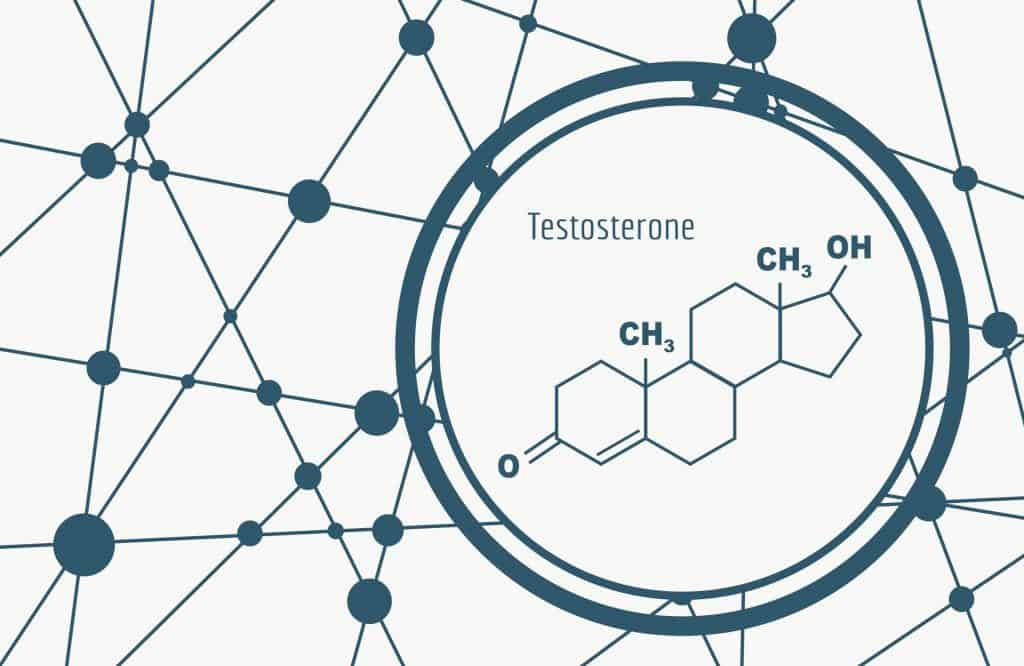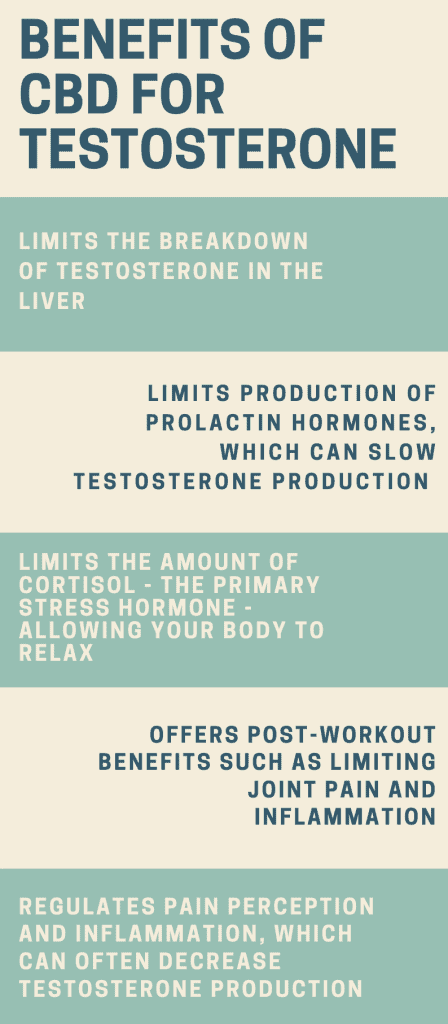CBD and Testosterone Levels, Here Are the Pros and Cons
Posted by Prescription Hope - See Editorial Guidelines (Last Updated On: Mon Jul 10 2023)
Wondering if there’s a connection between CBD and testosterone levels? In this article, we’ll outline the benefits of CBD on testosterone levels, as well as the potential issues you might come across.
Let’s start with a summary and then move into some details from there.
CBD and Testosterone Levels? CBD inhibits the 17α‐hydroxylase enzyme, reducing or limiting testosterone levels and production. For positive influence on testosterone levels, CBD improves testicular function, limits the breakdown of testosterone in the liver, and limits prolactin and cortisol production (stress hormones).
But there’s more to it than that, so let’s start by recapping what testosterone is.

What is testosterone?

Testosterone is a hormone that is naturally produced in the primary sex organs of the human body.
The starting point for this production begins during puberty and continues throughout adult life.
As you age, the production of these hormones slows down, typically at the age of 30 and over. Although this is a natural phenomenon, it can impact your body in a variety of surprising ways.
Your brain and pituitary gland control the production and distribution of testosterone in your body.
Many treatments for testosterone problems involve some form of testosterone replacement therapy.
With that background set up, let’s take a look at what CBD and testosterone levels present in terms of their relationship.
CBD and testosterone levels – connections and causes
Firstly, it’s important to acknowledge that there are many causes of low testosterone, of which the most common are:
- Chemotherapy
- Chronic disease
- Diabetes
- Drug or alcohol abuse
- Head injury
- High prolactin
- Hypothyroidism
- Injury to the testicles
- Kidney or liver disease
- Medications such as corticosteroids and opioids
- Previous steroid use
- Stress or anxiety-induced cortisol increase
So, there is no one-size-fits-all approach to explain how CBD and testosterone levels work together.
In general, CBD is believed to influence testosterone levels through its stimulation of the endocannabinoid system.
This connection has both positive and negative relationships. We’ll give insight into each of them.
CBD and testosterone levels – a positive relationship
The main positive connection between CBD and testosterone levels tends to stem from the endocannabinoid system. This system constitutes two cannabinoid receptors – CB1 and CB2 – scattered through the body and brain.
When these receptors are stimulated by CBD, they can regulate pain perception and inflammation which can cause low testosterone levels.
In male reproductive organs specifically, there are CB1 receptors that heavily influence testosterone levels.
Two of the main areas responsible for testosterone production are the “testes,” where testosterone is created, and the “brain’s hypothalamus,” where testosterone production is regulated.
Because CBD stimulates these CB1 receptors, CBD can positively influence and manage testosterone production and regulation.
Aside from this generalization, here is a small breakdown of other ways CBD creates a positive relationship with testosterone levels,

1. Limits the breakdown of testosterone in the liver
CBD is believed to limit and slow down the rate of testosterone breakdown in the liver.
This means that the rate or the duration of testosterone circulating in the blood will also be higher.
As such, the regulation of testosterone circulating in the blood ensures testosterone stability, limiting the downside of low testosterone production.
2. Limits production of prolactin hormones
Prolactin hormones are neurotransmitters that can slow your level of testosterone production.
CBD has shown potential promise in limiting the production of this hormone, in turn promoting a healthy production of testosterone.

3. Limits the amount of cortisol – the primary stress hormone
The release of cortisol is higher after any form of physical activity, such as an intense workout. Emotional or mental stress can also cause an increase in cortisol levels.
A high level of cortisol will breakdown tissues. This means the protein-synthesizing process will not be as efficient, and proteins will not get effectively built, inhibiting the development of muscles and leading to increased body fat.
CBD is known for its anxiolytic effect, which helps people to relax. In fact, it’s one of the most popular benefits of CBD.
CBD is an effective addition to treatment plans for both social and general anxiety disorders. It can limit the release of cortisol due to physical or emotional stress and thereby help your body produce more testosterone naturally.
By limiting the amount of emotional stress you feel, you can help your body produce more testosterone.
4. Offers post-workout benefits
Many people are now taking CBD as their go-to post-workout recovery treatment. To help limit body stress and improve testicular function.
CBD is well known for its natural anti-inflammatory effects which are derived from essential fatty acids.
Omega’s 3 and 6 in CBD can offer a variety of post-workout benefits.
Some of these benefits include keeping arteries smooth, counteracting inflammation, and limiting joint pain.
This all successfully helps your body obtain relief from post-workout stress quickly, thereby limiting the stress you place on your body.
As such, low stress improves your body’s natural testosterone production ability.
According to a year-long study in Spain conducted in 2010, ingestion of these same polyunsaturated fats (omega-3 and 6) increases and improves testicular function, which likely, in turn, helps to improve the levels of testosterone production.
CBD and testosterone levels – negative relationship
When analyzing the odds, a specific study on monkeys stated that CBD could reduce testosterone production.
As an overview, testosterone is mainly synthesized in the testes and ovaries and is made in response to hormonal signals from the hypothalamus. These hormones include LH (Luteinizing hormones) and FSH (follicle-stimulating hormones).
Higher doses (higher than those that humans would realistically use) of CBD have been shown to negatively affect LH and FSH levels in monkeys.
Although the dose demonstrated an increase in LH and FSH levels after 90 days, there were no changes in testosterone levels.
In fact, the level of testosterone tends to reduce at the highest CBD dose in monkeys.
Higher doses (higher than most of us would take) reduced testosterone in rats and mice after 10 – 34 days.
This negative relationship between CBD and testosterone levels is believed to come from CBD inhibiting the enzyme 17α‐hydroxylase, which makes testosterone in Leydig cells of the testes, eventually leading to a reduction in testosterone production.
More studies are needed to validate such a negative relationship between CBD and testosterone levels.
Medication tips for CBD and testosterone levels
- CBD can cause possible interactions with other medication or supplements you might already be using or potentially with other medical conditions you may already be experiencing.
- Although CBD has several positive influences for improving, increasing, and regulating testosterone levels, any decision should be made after careful consent from your doctor.
- As a general rule, it’s always advisable to take CBD in moderate doses, such as 5 – 100mg/day.
- Exercise regularly to promote natural testosterone production while using CBD.
- Most importantly, follow a cyclical use. Meaning take breaks every few months to washout accumulated CBD.

To finish
We hope this has provided you with a greater understanding of CBD and testosterone. Ultimately, to be safe, consult your doctor or specialist regarding any changes you make to your medications or where you might be planning a change. If you’re having any of your medications, enroll with us and see if you qualify to pay only $60.00 a month through Prescription Hope’s medication access service for each of your medications.


